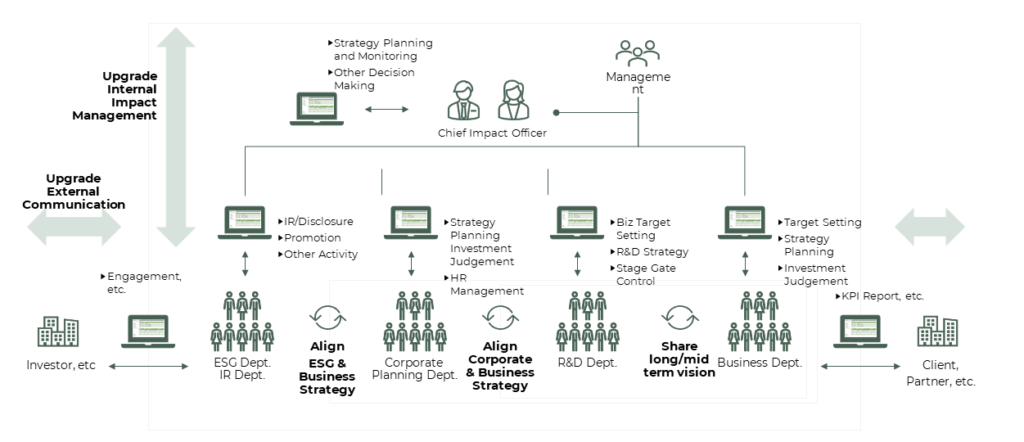Related to the following themes:
Understanding and Explaining the Importance of Impact Management in Business Operations.
Understanding and Exploring Practical Applications of Impact and Impact Management.
Understanding the Practical Challenges of Impact Management in Business.
Establishing an Impact-Driven Culture in Communication and Decision-Making
Given that impact initiatives are inherently long-term in nature, the approach to their execution and management must also adopt a medium- to long-term perspective. IMPACTLAKE facilitates the advancement of clients as “impact-focused companies” through two key dimensions: internal management and external disclosure and dialogue. This approach ensures that impact is interwoven with departmental objectives and contributions, aligning it with decision-making and strategies across various divisions and business areas. This, in turn, enables comprehensive control over impact at the organizational level. Moreover, a consequential benefit is the increased reliability of disclosed information externally, which has a positive impact on stakeholders such as investors. Internally, it provides an opportunity for employees to recognize the magnitude and importance of social significance in business activities and other endeavors.

The following roles are anticipated for each department:
CIMO(Chief IMpact Officer)
※May also be known as Chief Sustainability Officer (CSO), often assuming responsibilities in the Strategic Planning or ESG departments.
- Organizing and managing the impacts generated by the company.
- Ensuring alignment between impact and strategy, and establishing both strategic and practical functions necessary for impact-oriented management.
- Overseeing company-wide impact management.
ESG Promotion Department and IR Department
- Reporting, dialogue, and dissemination of the impacts generated by the company to external stakeholders.
- Providing and gathering various internal information.
- Collecting information on recent trends and investor concerns.
Strategic Planning, Corporate Departments, Business Units, etc.
- Driving the development of various strategies and decision-making aligned with the strategic impacts the company has set out to achieve as a whole.
- Developing specific roadmaps for achieving the strategically set impacts and executing them, along with systematic management and enhancement.
- Incorporating these impacts into recruitment activities and attracting engagement and involvement from customers and partners.
Utilizing Impact and Leveraging impactlake™
To establish a comprehensive organizational impact management framework and drive impact-oriented business operations and management, impactlake™ offers the following functionalities:
Key Features
- Impact Model (Logic Model) Creation Wizard
- Quantification of Impact
- Impact Management Dashboard
- Impact Web Disclosure
- Domain-Specific Standard Impact Models (Logic Models)
- Impact Accounting
- Simplified Impact Report Generation
- Impact Portfolio and Departmental Management
- Impact Planning and Budget Monitoring
Utilizing impactlake™ for Achieving Company-Wide Impact Management
The concrete vision of achieving company-wide impact management through the use of the aforementioned features is as follows:
- Establishing a Master Impact Model (Logic Model): Create a company-wide Master Impact Model (Logic Model) that aligns with the enterprise’s long-term value creation narrative. Each department should consider this model as a key reference, which naturally instills an awareness of the relationship between their departmental operations and the overall enhancement of corporate value.
- ECentralized Management of KPIs and Metrics: Streamline the management and collection of various KPIs and metrics that ESG departments and others struggle to plan and collect. This eases the operational burden while enabling comprehensive impact assessments and impact accounting across the entire organization, moving away from isolated initiatives toward holistic impact evaluation.
- Enhancing Transparency and Accuracy: In an environment of growing concern about ESG ‘greenwashing,’ impactlake™ allows for the transparent and accurate management of internal processes in a digital, integrated manner. This facilitates governance-aligned KPI and metrics management and their external reporting.
- Fostering an Impact-Oriented Organizational Culture: Rather than having only relevant departments increase their knowledge and handle impact as part of their routine duties, create opportunities for individuals in various business units, including those not directly related to impact, to engage with impact-related activities. This indirectly contributes to the development of an impact-oriented organizational culture and the nurturing of specialized talents, which can be challenging to achieve solely through occasional consulting.
Exploring and Utilizing Impact Management
In the practical realm of impact management and impact accounting, publicly available information is still limited. IMPACTLAKE strives to systematically organize methodologies, case studies, and tips, making them as comprehensive as possible. We encourage you to make use of this information. Furthermore, for those considering the establishment of a structure and workflow to maximize the use of these resources and to continue creating value consistently, please don’t hesitate to contact us.
Additional Knowledge on Impact Management and Impact Accounting can be found here.
If you are considering utilization, please feel free to contact us.
At IMPACTLAKE, we not only offer tools and support for their utilization but also provide consulting services related to “company-wide impact management.” For those who wish to kickstart the utilization of impact within specific themes on the path to achieving continuous impact management, we are prepared to propose a flexible process and steps to help you move forward.
Consulting Services Information
